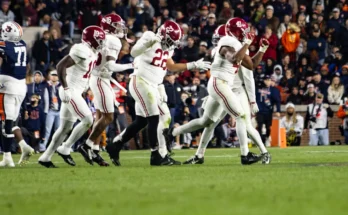Kelvin Sampson’s Parting Shot: Houston Coach Criticizes ACC After Gritty Win Over Duke Blue Devils
In what was already one of the most talked-about matchups of the NCAA Tournament, the Houston Cougars’ victory over the Duke Blue Devils sent shockwaves through college basketball—not just because of the result, but because of what followed. After guiding his team to a bruising, defensively dominant win over Duke, Houston head coach Kelvin Sampson used his postgame remarks to deliver pointed criticisms of the Atlantic Coast Conference (ACC), questioning its physicality, its competitive grit, and even its national reputation.
Sampson’s Cougars, known for their relentless defense and physical brand of basketball, held the traditionally high-powered Blue Devils to one of their lowest scoring outputs of the season. But the real fireworks came during the postgame press conference, where Sampson didn’t hold back when asked about the matchup.
“This isn’t the ACC,” Sampson said, pausing for effect. “In the Big 12, and especially at Houston, we don’t flop for calls. We play real basketball. You’re going to get hit, and you’re going to have to play through contact. I told our guys before the game—be the hammer, not the nail. And I think you saw who was who out there tonight.”
The comments quickly went viral, lighting up social media and basketball talk shows alike. Fans from both sides of the aisle had plenty to say, with Houston supporters rallying around their coach’s no-nonsense attitude, and Duke and ACC loyalists decrying the remarks as unnecessary and disrespectful. But Sampson, never one to mince words, seemed unconcerned about ruffling feathers—especially after his team had just punched their ticket to the Elite Eight at Duke’s expense.
To understand the full impact of Sampson’s remarks, one must consider the backdrop. Duke, long considered one of the blue bloods of college basketball, entered the game with a mix of youthful talent and postseason expectations. Jon Scheyer’s squad had been on a late-season tear, fueled by standout performances from freshman phenoms and seasoned leadership from upperclassmen. Yet, against Houston, that offensive rhythm evaporated.
Houston’s smothering defense—ranked among the top in the country all season—forced Duke into rushed shots, disrupted passing lanes, and made every drive to the rim a war. The Blue Devils struggled to establish any interior presence, and their backcourt found itself hounded by a relentless Cougars press that rarely let up. Duke managed just [insert actual point total], shooting a paltry [insert percentage] from the field.
Sampson clearly saw that performance not just as a victory for Houston, but as validation of his philosophy and a rebuke of the style of play he believes is too common in the ACC.
“Every conference has its identity,” he added. “The ACC? A lot of finesse, a lot of flash. But the tournament doesn’t care about that. It rewards toughness, discipline, and heart. That’s what wins in March. That’s what Houston basketball is built on.”
Duke head coach Jon Scheyer, when asked to respond to Sampson’s comments, took the high road.
“Coach Sampson has every right to speak his mind. They earned that win,” Scheyer said. “But I believe in our guys. We played a hard game, and we’ll learn from this. That’s what this time of year is about. We have a young team, and we’ve come a long way. It just wasn’t our night.”
While Scheyer avoided escalating the war of words, the damage—at least reputationally—may already be done. Sampson’s critiques tapped into a broader national debate that has been simmering for several seasons: is the ACC slipping in relevance and toughness?
Once the unquestioned standard of college basketball, with titans like Duke, North Carolina, and Virginia dominating March, the ACC has recently found itself under scrutiny. Outside of a few standout seasons, the conference has lacked the depth and consistency that characterized its golden years. Sampson’s comments, though blunt, echoed what some analysts have whispered in recent years—that the ACC may be losing its edge.
What makes this situation even more compelling is the symbolic nature of the matchup. Duke, the ACC’s crown jewel, represents tradition, talent, and a distinctly modern take on college hoops—emphasizing NBA-ready skill and offensive creativity. Houston, by contrast, channels a more old-school ethos: hard-nosed defense, veteran leadership, and blue-collar effort. In beating Duke—and beating them physically—Sampson and his squad made a statement about which approach holds up better in the crucible of March Madness.
Of course, the fallout from Sampson’s postgame remarks will extend far beyond this one game. ACC supporters have already fired back, pointing to the conference’s historic success and dismissing Houston’s comments as arrogance. Others have defended Duke, noting that a young team hitting a rough night against an elite defense doesn’t mean the entire conference is soft or flawed.
Still, Sampson’s words will stick. Not just because of what he said, but because his team backed it up on the court.
As for the Blue Devils, the offseason now begins with a mixture of soul-searching and motivation. The loss stings—especially with the manner in which it happened—but it also offers valuable lessons for a program still shaping its identity under Jon Scheyer’s leadership. Scheyer has recruited well and has the pieces to contend again next year, especially if key underclassmen return and the incoming class lives up to the hype.
But if there’s one message they’ll surely carry into the summer workouts and beyond, it’s the one delivered so bluntly by their opponent’s coach: March demands toughness.
As the Blue Devils regroup, they’ll be reminded not just of the X’s and O’s, but of the bruises, the blocked shots, and the missed calls. Of the physicality they met at the hands of a Houston team that came not just to win, but to send a message. And of the postgame jab that turned a tournament loss into a rallying cry for a program eager to reassert its dominance.
Meanwhile, Sampson and the Cougars march on—battle-tested, confident, and brash. Their coach has made it clear: they’re not here to make friends. They’re here to win. And in doing so, they’ve reminded the basketball world that toughness is still the currency of champions.
As the dust settles on a feisty, unforgettable matchup, one truth remains—college basketball thrives on rivalries, on passion, and on moments like these. Kelvin Sampson knew exactly what he was doing. He didn’t just beat Duke. He challenged them—and the ACC as a whole—to respond.
And now, the ball is in their court.



